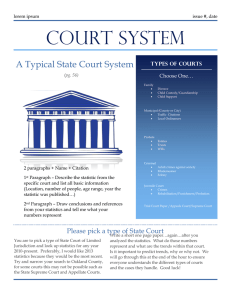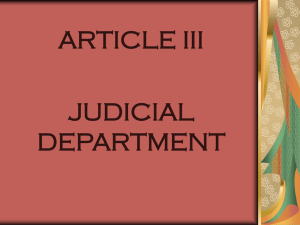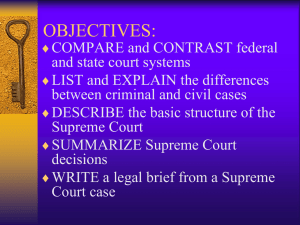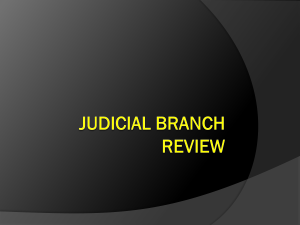Judging the Courts - Dr. Seth W. Greenfest
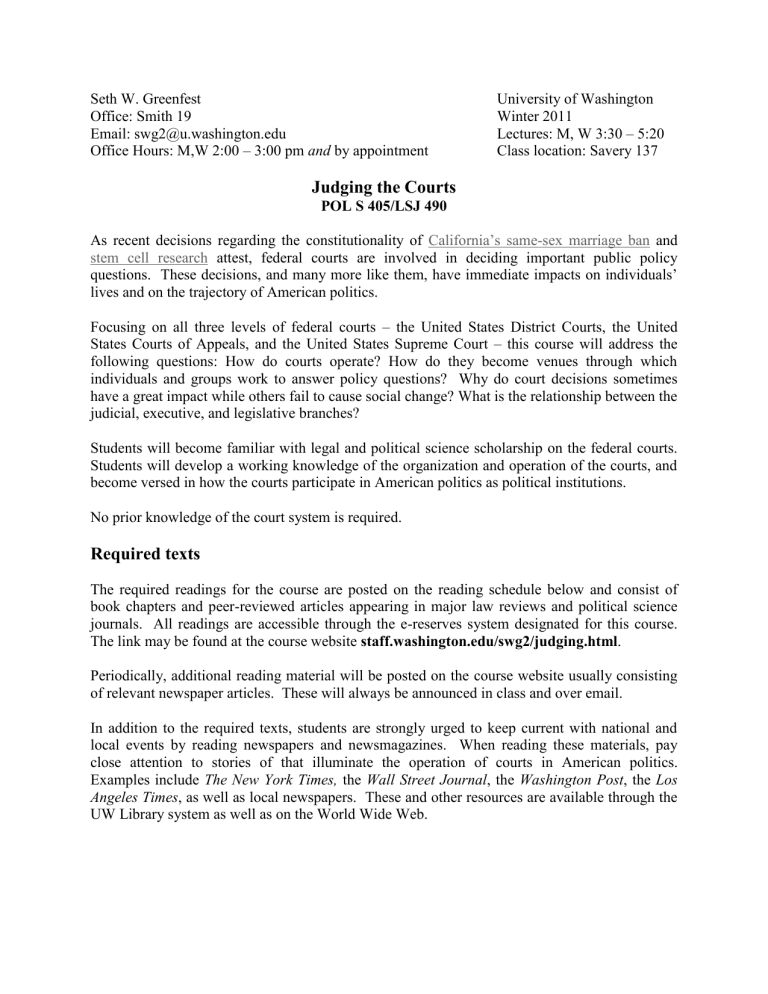
Seth W. Greenfest
Office: Smith 19
Email: swg2@u.washington.edu
Office Hours: M,W 2:00 – 3:00 pm and by appointment
University of Washington
Winter 2011
Lectures: M, W 3:30 – 5:20
Class location: Savery 137
Judging the Courts
POL S 405/LSJ 490
As recent decisions regarding the constitutionality of
California’s same-sex marriage ban
and stem cell research attest, federal courts are involved in deciding important public policy questions. These decisions, and many more like them, have immediate impacts on individuals’ lives and on the trajectory of American politics.
Focusing on all three levels of federal courts – the United States District Courts, the United
States Courts of Appeals, and the United States Supreme Court – this course will address the following questions: How do courts operate? How do they become venues through which individuals and groups work to answer policy questions? Why do court decisions sometimes have a great impact while others fail to cause social change? What is the relationship between the judicial, executive, and legislative branches?
Students will become familiar with legal and political science scholarship on the federal courts.
Students will develop a working knowledge of the organization and operation of the courts, and become versed in how the courts participate in American politics as political institutions.
No prior knowledge of the court system is required.
Required texts
The required readings for the course are posted on the reading schedule below and consist of book chapters and peer-reviewed articles appearing in major law reviews and political science journals. All readings are accessible through the e-reserves system designated for this course.
The link may be found at the course website staff.washington.edu/swg2/judging.html
.
Periodically, additional reading material will be posted on the course website usually consisting of relevant newspaper articles. These will always be announced in class and over email.
In addition to the required texts, students are strongly urged to keep current with national and local events by reading newspapers and newsmagazines. When reading these materials, pay close attention to stories of that illuminate the operation of courts in American politics.
Examples include The New York Times, the Wall Street Journal , the Washington Post , the Los
Angeles Times , as well as local newspapers. These and other resources are available through the
UW Library system as well as on the World Wide Web.
Course requirements
Completion of required readings. In order to be successful in this course, several things are expected of students. First, students are expected to complete all of the readings before the lecture on the date for which they are assigned. Failure to keep up with the readings will severely limit your ability to contribute to and learn from class lectures and activities. Students will be regularly called on to answer and pose questions related to course materials during class.
Meaningful class participation. Students are expected to attend all lectures and participate in class discussions. Some of the class readings will be difficult, so discussions will be critical for facilitating understanding of the material. Therefore, students are encouraged to ask questions during class. Productively engaging the material is not about being “right” or “wrong”; it is about thinking critically and puzzling through the material. Participation will count for 15% of your grade.
Paper Assignment.
Students will complete a quarter-long research assignment, culminating in a research paper of 8 pages in length. The paper topic will be handed out in the first week of the quarter and throughout the quarter, students will participate in activities to assist them develop and complete their project. The research paper will count for 30% of your final grade and is due
February 21, 2011 (both in-class and electronically). Students will provide a short presentation on their paper.
Communicate . Students are expected to communicate with me in a timely manner if anything arises that impacts their ability to complete an assignment. Students should note the difference between a one-time absence and an issue that requires them to miss class on a regular basis or fail to complete an assignment. By discussing any long-term problems with me, together we can formulate a plan to deal with the situation and make sure that students are able to successfully complete the course.
Grade Breakdown:
Participation in Class Discussions
Midterm Exam
Final Paper
Final Exam
15%
25%
30%
30%
Grade Appeals. Grade appeals will take place in the following manner:
1.
Wait 24 hours after an assignment has been handed back, but no longer than 7 days, before making a complaint. You should re-read your paper and any comments given to you, during this time.
2.
Submit a written complaint to me detailing your objection to the original grade with specific illustrations of why you think you deserve a different grade.
3.
Make an appointment to see me.
4.
I will re-read your paper and discuss it with you and/or provide you with a written explanation.
5.
You will get a response from me within one week.
Writing. Students have many resources to assist them with their research project, including the
Political Science Writing Center. The Writing Center is located in Gowen 105, and on the web at depts.washington.edu/pswrite. Students are expected to turn in polished, proofread papers with sources cited properly.
Office Hours and Email. My office hours and location are listed at the top of the syllabus.
Students are encouraged to utilize my office hours as they are an opportunity for us to discuss one-on-one course materials and your ideas. In addition to office hours I am available by email.
Emails sent M-F between 9:00 am – 5:00 pm will generally receive a response the same day. I have a generous communication policy when it comes to my students. This means that I make every effort to be available to answer your questions and discuss with you the course materials.
Academic Conduct.
The University of Washington’s Student Conduct code will be enforced, including the policy on plagiarism. The entire policy can be found at http://www.polisci.washington.edu/Dept_and_Univ_Policies.pdf
. I will strictly enforce this policy. The best way to successfully adhere to this policy is to learn the correct methods for citing other people’s work. The Political Science Writing Center is a good resource for learning these methods. I can provide assistance with this as well.
Disabled Students. To request academic accommodations due to a disability, please contact the disabled student services office, 448 Schmidt Hall, 543-8924 (V/TDD). If you have a letter from their office, please share it with me as soon as possible so I may make accommodations.
Cell phones and computers . Please DO NOT send text messages during our class time as they distract from the task at hand. The use of computers is encouraged on the condition that students
DO NOT spend their time visiting websites irrelevant to the class activity.
Reading Schedule
You should complete each set of readings before the class meeting for the date listed on the schedule. I will try to stay on this schedule, but will make adjustments if necessary.
Adjustments in the readings schedule will be announced in class.
January 3
What’s this all about?
The Syllabus
The Constitution
January 5 What is a court? Shapiro, Martin. Courts . 1-37.
Paper assignment handed out
January 10 What is the federal judiciary? Rowland, C.K. and Robert Carp. Politics and
Judgment in the Federal District Courts .
Chapter 1.
Songer, Donald R, Reginald S. Sheehan, and
Susan B. Haire. Continuity and Change on the
January 12
January 17 No Class: MLK Day
January 19 Getting into Court:
Introduction to Jurisdiction and
Case Selection
January 24
January 26
January 31
Becoming a Judge: The
Nomination Process;
Nominations and Voting
Behavior
More on Jurisdiction:
Congressional control of jurisdiction
Standing to Sue
A Second Look at Standing
United States Courts of Appeals .
Chapter 1.
Baum, Lawrence. The Supreme Court .
Chapter 1.
Martinek, Wendy et al. “To Advise and
Consent: The Senate and Lower Federal Court
Nominations, 1977-1998.”
Rowland, C.K. and Robert Carp. Politics and
Judgment in the Federal District Courts . 45-
57.
Songer et al. Chapter 2.
Segal, Jeffrey and Harold J. Spaeth. The
Supreme Court and the Attitudinal Model
Revisited. 223-230, 240-278.
Chutkow, Dawn. “Jurisdiction Stripping:
Litigation, Ideology and Congressional
Control of the Courts.”
Greenfest, Seth W. “Jurisdiction Granting:
Legislative Capacity and Ideology.”
Gunther, Gerald. “Congressional Power to
Curtail Federal Court Jurisdiction.”
Solimine, Michael. “Congress, Separation of
Powers, and Standing.” 1 – 12.
Segal and Spaeth. 230-240.
DOMA Case on Standing (link on course website).
Pierce, Richard. “Is Standing Law or
Politics?”
Greenhouse, Linda. “Who Stands for
Standing?” (link on course website)
Mid-term review
February 2
February 7
Midterm, in class
Judicial Review Fisher, Louis and Katy J. Harriger. American
Constitutional Law Volume 1: Constitutional
Structures Separated Powers and Federalism .
33-48, 55-62.
Graber, Mark. “The Problematic
Establishment of Judicial Review.”
Lilly Ledbetter v. Goodyear (link on website)
February 9
February 14
How Judges Decide
How Judges Really Decide I
Fisher, Louis and Katy J. Harriger. 62-75.
George, Tracey and Lee Epstein. “On the
Nature of Supreme Court Decision Making.”
Baum. “Legal Model.” 114 – 120.
Epstein and Knight. The Choices Justices
Make. Chapter 1.
February 16 How Judges Really Decide II Segal and Spaeth. “Attitudinal Model.” 86-97.
February 21
February 23
February 28
The President and the Supreme
Court
Research papers due in class and electronically
No Class: President’s Day
The Public and the Supreme
Lindquist, Stefanie A. and Rorie Spill
Solberg. “Judicial Review by the Burger and
Rehnquist Courts: Explaining Justices’
Responses to Constitutional Challenges.”
Garman, Judge Rita B. “Deliberation,
Deference, and Discretion: Reflections on
Decision Making at the Trial, Appellate, and
Supreme Court.”
Citizen’s United
(link on course website)
Segal, Jeffrey. “Amicus Curiae Briefs by the
Solicitor General during the Warren and
Burger Courts: A Research Note.”
Bailey, Michael, Brian Kamoie, and Forrest
Malztman. “Signals from the Tenth Justice:
The Political Role of the Solicitor General in
Supreme Court Decision Making.”
Mishler, William and Reginald S. Sheehan.
March 2
March 7
March 9
March 17
Court
Courts in Society: Impact of
Decisions
Putting it into Practice
Putting it into Practice, Too
The Grand Finale
Final Exam
2:30 pm – 4:20 pm
Savery 137
“The Supreme Court as a Countermajoritarian
Institution? The Impact of Public Opinion.”
Caldeira, Gregory and James Gibson. “The
Etiology of Public Support for the Supreme
Court.”
Epstein and Knight. Chapter 5.
Rosenberg, Gerald. The Hollow Hope .
Chapter 1.
McCann, Michael. “How the Supreme Court
Matters in American Politics: New
Institutionalist Perspectives.”
Research Presentations
Research Presentations
What We’ve Learned

